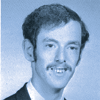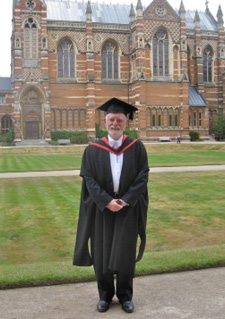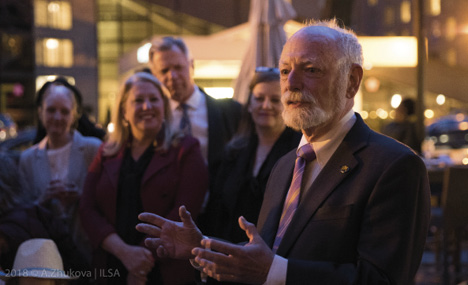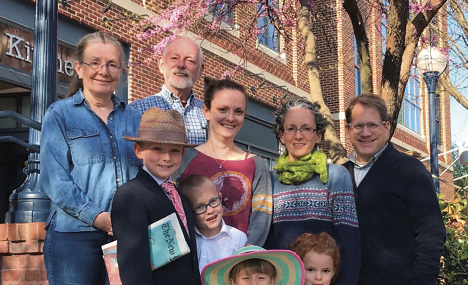Steven M. Schneebaum – 50th Reunion Essay
Steven M. Schneebaum
 2932 Cortland Place, NW
2932 Cortland Place, NW
Washington, DC 20008
sms@smslawdc.com
202-744-3838
Spouse(s): Karen McGovern Schneebaum (1972)
Child(ren): Megan Alexandra Schneebaum (1977, married to Jason Rosenberg); Rachel Claire Oelslager (1980, married to Stephen J. Oelslager (deceased))
Grandchild(ren): Felix Skye Rosenberg (2009); Nathan Clint Oelslager (2010); Sara Gene Oelslager (2013); Luna Grey Rosenberg (2013)
Education: Oberlin College, M.A. 1970; Oxford University, BA 1976 (M.A. 2010); Geo. Washington Univ., MCL (AP) 1978
Career: International lawyer and litigator since 1976; partner in three law firms 1978–2014; solo practitioner since 2014; engaged in human rights, death penalty representation, and other pro bono activities throughout my career; adjunct professor of international and constitutional law at Johns Hopkins School of Advanced International Studies since 1991.
College: Trumbull
The biodata recited above tell the basic story. I have had a successful and fulfilling life by the measures that count. I have endured frustrations and survived tragedies, as we all have, but have had great fun. I am also not sure that what I have fished from the maelstrom of these last five decades is any more valuable than what any of our classmates have learned, or that what I might record for posterity is any more insightful than the bequests we all have begun, at our advanced age, to finalize.
Four grandchildren regularly have to endure my tales of exploits enjoyed, of opportunities embraced and opportunities missed, of wisdom pursued and occasionally achieved, since our graduation. Karen and our family, friendships, travel, and humor; the law, logic, and language: all of these have made each next day worth greeting since we all walked through Noah Porter Gateway together in 1969. Without any one of them, I would not look back on these years with anything like the satisfaction that I am fortunate enough to experience.
I remain as dedicated to my legal practice now as I have ever been. As a lawyer and law professor, as a father and grandfather, and also as a citizen, I have tried to live, and to inspire the next generation to embrace, a commitment not only to justice as an abstract goal but to the means of seeking it, not only to culture but to the human connections it makes possible, and not only to study but to the discipline and rigor it requires and the rewards that it bestows. Karen and I tried to raise our daughters to treasure these things. Only if these are my “watch-cry…where’er upon life’s seas I sail,” may I claim that Yale succeeded in educating me.
And I have found great comfort, throughout my life, in the confidence that the country to which my four grandparents and my father immigrated, for all its flaws, is inspired by these same principles. That belief permitted me to envisage a future for my daughters and grandchildren supportive of individual dreams that, like ours when we were young, propel people to take risks and to chart futures. I counted on a national dedication to truth, to reason, to eloquence, and to civilization that would also be demanded of our leaders. I took for granted that we Americans shared a belief in those principles, which were certainly the common ethos of our Yale years, even as we disagreed about precisely how they might be translated into the real world.
Recently, however, my realization that those fundamental assumptions may actually be mistaken has been deeply troubling. Frightened by the tribalism, the anger, and the resentments that surround us, I am pessimistic about the future of the United States. The challenge now is to spend our closing years refining our collective legacy, and not only the individual reflections so articulately set out by our classmates in this volume.

The day I received my M.A. from Oxford University (Keble College), 7/31/10.

Receiving a lifetime achievement award from the International Law Students Association, 4/9/18.

TheWhole Gang: (L to R) (Front Row) Felix, Nathan, Luna, Sara; (2d Row) Karen, Rachel, Megan, Jason
If the above is blank, no 50th reunion essay was submitted.
